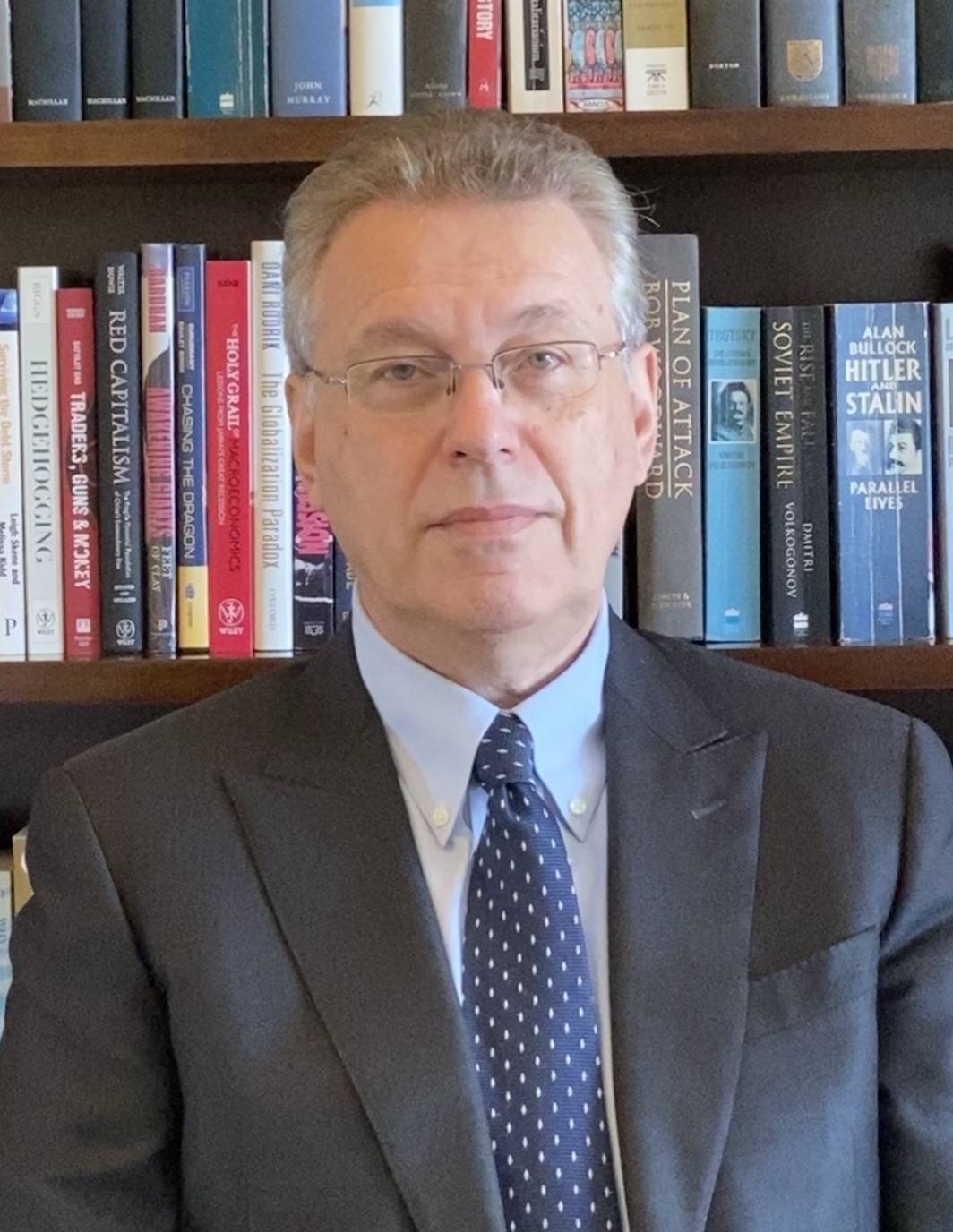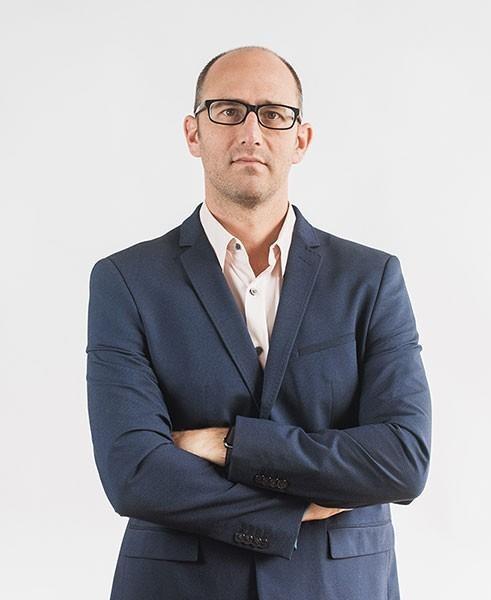Transcripts

Erik: Joining me now is Viktor Shvets, global strategist at Macquarie Bank. Viktor was born in Kyiv, Ukraine and has lived in Hong Kong and China for the last 20 years. So needless to say, he has quite a bit of perspective in terms of different cultures and the geopolitical situation that the world now faces. Viktor, it's great to get you back on. I listened into our interview from one year ago, which was also about one month before the Russian invasion of your home city of Ukraine, which at the time when you were born was still part of the Soviet Union. The world has changed quite a lot. In our last interview, we discussed geopolitics. You predicted that politics would no longer contain geopolitics, and the geopolitics would become a bigger issue as time moves forward. Needless to say, you got that call, right. Any particular reflections on the Ukraine conflict and what it means to the global economy?
Viktor: Well first, thank you very much for inviting me. I still think that geopolitical and social polarization problems that we have been experiencing for the last 10 years will continue to build over the next 10 years, maybe 15 years, maybe longer. I really can't see how politics will be able to control either social tension, polarization tension, or geopolitics for a long time to come. But the interesting thing for me is not so much whether geopolitics will remain contentious, or social pressures will remain contentious. But rather, geopolitics and politics are more of a process. It's not an event. It doesn't mean that we kill each other every day, it doesn't mean that we confront each other every day, it doesn't mean that it blows up every day. I usually tell my fund management friends that it took Hitler 15 years to come to power. So it's a process, not an event. And so from an investment point of view, I think it's extremely valuable to try to identify periods where you think social and geopolitical pressures will really build up and create major problems, economic problems, political problems, disrupt supply and demand. And times when those pressures will be relatively subdued. In other words, instead of exploding, they're more likely to simmer. So the ultimate destination is still not good. I do think those pressures will build. But I think in 23 and 24, there is a possibility and a strong possibility that those pressures will become a little bit less pronounced. And there are reasons for that.
First, if you look at Russia-Ukraine, my view certainly for the last 12 months, was to say that whatever Russia wants Ukraine to do, Ukraine will never accept and whatever Ukraine wants Russia to do, Russia will never accept. That basically implies a stalemate, neither side wins. And yes, you're going to have regular attacks, particularly at the time when the ground is solid. So that's usually in winter or summer, but at the end of the day, neither party can succeed. Ukrainians are not weak, they're strong, and they're determined, and Russia always looks weaker than it is, and always looks less capable than it is. And I think Russia will also continue to be a very strong opponent. So what it basically means for 23 and 24 in my view, the bulk of the economic, political and geopolitical impact of the Russia-Ukraine war is already behind us. The other question is, there's no destruction of either state, but the question is, at what stage will we start drawing our dotted lines on the map, because there is no resolution, there is no final resolution to this conflict. But it doesn't mean that the fighting goes on forever. Eventually, there will be some kind of not reconciliation, but at least dotted lines, whereby you sit here and I sit there and we agree to disagree, and 23 and 24 ought to be that period for Russia and Ukraine.
At the same time, if you look at other geopolitical hotspots, such as the South China Sea and Taiwan, I actually think through the next two years, The same would apply to Taiwan, in a sense that one of the lessons China learns from Ukraine is that number one, Taiwanese are going to fight. Number two, they're going to be armed. Number three, private US companies and the Pentagon will provide them an edge in cyber and cyberspace. I think they have to understand that China needs to restructure the armed forces and make them much more mobile and independent. And of course, they need to address the issue of economy and monetary system. Remember, Russia was isolated for eight years before this war, and even then Russia could not retrofit its system. China is the world's biggest trader. How do you retrofit a system like that against sanctions and other problems you will have in monetary ways? How do you do that? And the answer is, you can't. When people say, well, they should abandon the US dollar and sell US Treasuries, my answer is, by what? What are you going to buy? There is nothing else to buy and there is no substitute for the US dollar. And so China needs time to be able to rebuild trade routes, redirect trading of commodities, through direct trading of products, boom, other people, capital, information, gradually build different settlement systems. And maybe then the economy can be retrofitted.
So one of the lessons of the Russia-Ukraine war, to my mind, is likely to make Taiwan and the challenges less likely, at least in the near term. And so when I look at it, it doesn't mean that there won't be flashes of anger, of course, there will be. People tend to forget, if you think of West Berlin, there were all sorts of heart attacks. It was 1947 airlift, there was 1953 revolution in German Democratic Republic, there was 1956, there was 1961, there was 1968. But ultimately, West Berlin survived through this process. So there won't be heart attacks along the way, clearly, but I think at least in the shorter term, the probability of anything significant flaring up is actually down. And we can look at the Middle East and other in other sort of tectonic plate, globally, that again, I say the probabilities today a little bit less than what there were 12 months or 18 months ago.
So my conclusion from a geopolitical perspective is not to say that everything is resolved, nothing is going to be resolved. It's not to say that we're close to agreements, nobody will ever be close to agreement, but simply to identify, as I said, the times when you have a flare up, and at times when it's likely to become less pronounced. Also, remember from China's perspective, that the only time China would decide to invade Taiwan is if they're cornered externally, and only the United States can do it, and they're unlikely to do it. Alternatively, there is some kind of problem domestically within China, again, through 2023 and through 24. I just don't see it happening. So, to me, from an investment perspective, I think geopolitics will play a smaller role in the next two years than it did in 2022.

Erik: Joining me now is Lyn Alden, founder of Lyn Alden Investment Strategy. Lyn has prepared a slide deck to accompany today's interview. Registered users will find the download link in your research roundup email. If you don't have a research roundup email, just go to our homepage macrovoices.com. Click the red button above Lyn picture that says looking for the downloads. Lyn, it's great to get you back on the show. Last time we spoke, I think oil prices were around $90 or so. And you told our listeners look, you are very, very bullish longer term, but you thought in the short term prices could get all the way down to $70. You totally missed that call. It was $70.08 so you're eight cents off. I think we'll go ahead and score that one as a win. How should we look at it now though? Does that mean the bottom is in at 70.08 or could it be that we've got another wave down and are you still bullish long term? And when do you think this this market turns around?
Lyn: Sure Good questions and thanks for having me back. I'm still long term bullish on energy, the supply demand situation is still long term very tight. You know, especially on the supply side. And now we have China partially reopening to some degree. We'll see how fast or how slow that goes. But essentially, the long term thesis I think, is still quite bullish for the whole space. In the near term. I think that at these, these lower price levels, it's been de-risked to some extent in the intermediate term. At this point, you know, I'm not trying to call a specific, you know, exact bottom on the market, there's still a lot of like a lack of clarity for the next few months in terms of decelerating economic activity. But I think that as you look out a couple years, I think the situation is still quite bullish. So you know, a lot of this clarity in the near term, but still very bullish long term. And I think a lot of oil equities are attractive, I think a lot of pipeline equities are attractive. And I think also, the underlying is pretty attractive.

Erik: Joining me now is Robert Friedland, who is probably best known as Chairman of Ivanhoe Mines and Ivanhoe Capital but he's also the chairman of a company you might not have heard of called I-Pulse. We'll be talking more about that in today's interview. Robert, it's great to get you back on the show. Our listeners have heard from me in recent weeks that I'm convinced that an energy crisis, a global energy crisis is imminent. I think the fact that we are currently enjoying low crude oil prices is an illusion that won't last very long. But you've certainly been around energy markets longer than I have. What's your take?
Robert: Well, it's great to be back with you Erik. It's amazing how much the world has turned. We went around the sun once and everything we talked about a year ago has come to be real. The energy crisis you're referring to is not a future phenomenon. It's here now! It has arrived. It's arrived because suddenly the world is at war and war has changed everything. We have such high electricity prices in Europe that smelters that produce metal can't afford to operate. They're shutting down. And that's only an $80-$90 crude oil, but astronomically high electricity prices in Europe. That's an amazing story of how we got there from here. But the energy crisis is already upon us and Russia is a giant crude oil producer arguably the largest, if not the second largest. And now that we've placed sanctions on Russian energy, just the marginal reduction in production has put the world on a knife's edge for energy. We thought that the price of coal was gonna go down, we don't need it anymore. But Glencore made $16 billion mining coal last year, coal prices have skyrocketed. The Germans are burning coal to get through the winter. Angela Merkel had closed about 16 nuclear power plants in Germany. She was reliant on Nord Stream one and two, Russian natural gas. What a silly thing to do now that that natural gas is no longer available. The minute it got cold in Europe and the wind stops blowing all of Europe is short of electricity. We haven't seen electrical prices this high ever. It's already for Europe, an existential crisis. We haven't seen a major European population be bombed into the stone age. So they freeze in the dark. That's a moral obscenity. But that's what's happening to 40 million people in Ukraine this winter. And the implications are apparent, we are extremely vulnerable to a global energy crisis. Europe itself has only a few remaining natural gas pipelines. There's a natural gas pipeline from Norway to Europe. And there's some natural gas coming from Algeria to Spain and to Italy. But we now know that those ocean bottom pipelines are vulnerable to sabotage, as are all the Internet backbone that goes across the ocean and fiber optic cables. And so all of this fundamental infrastructure is now known to be vulnerable. And every major society is worrying about securing its own supply chain.
So Erik, if we go back to what we were talking about a year ago, in about 2008, we had an integrated world economy. It was just-in-time, everybody loved everybody. If you went to Walmart, everything said made in China. Today we have a just-in-case economy. Every society wants to secure their energy supply chain, their food supply chain, their basic raw material supply chain. The Japanese are rebuilding an army it was just announced last week that Japan's gonna spend 2% of GDP to build an army. They haven't done that since World War Two. Ditto, the Germans haven't had an army worthy of their name since World War Two. The Koreans want their own supply chain, they don't trust the Japanese. The Chinese want their own supply chain. India wants its own supply chain. Europe wants its own supply chain. Of course, America now has its partnership with the five eyes. So as we've balkanized the world economy, it's an insanely inflationary phenomenon. And each group plays to its own strengths and the people that are long energy, want to drive the price up. Vladimir Putin benefits from high energy prices. And now we have a situation where cheap Iranian drones are being bought by Russia and used on Ukrainian civilians. Obscene, obscene destruction of the energy backbone in Ukraine, which incidentally, feeds electricity to Europe. So here comes 1000 cheap drones a you, you might shoot down 950 of them, the other 50 get you. If those Iranian drones were turned on Saudi Arabia, for example, we could have $200-$300 crude oil forever. So I think the first point we need to make is that we should thank God every day, for the energy security the Western world enjoys from Saudi Arabia. Saudi Arabia, as a reliable supplier of energy to the world is literally keeping the lights on. They don't want the price to be so low, that you have less energy production. And they don't want it to be so high that you destroy the Western world economy. But without their responsible role in conventional energy, there would be no hope of making an energy transition. And so, you know, if you take 10 dogs in a room, I think you will observe that those 10 dogs all smell both ends of every dog. And so every nation now is worried about its own energy security and food supply. And that means that we already today in an energy crisis.

Erik: Joining me now is 42Macro founder, Darius Dale. Darius prepared a slide deck to accompany today's interview. I encourage you to download it as we will be making extensive references to it throughout our discussion. Registered users will find the download link in your research roundup email. If you don't have a research roundup email, just go to our homepage at macrovoices.com. Click the red button above Darius' picture that says looking for the downloads.
Darius, I really want to give you credit, we had you as one of our very first guests in 2022 on this program. At the time, the stock market, the S&P was I think just barely below 4800. Everybody was talking about buying the dip and you know, market can't go any lower. You came out in January of 2022 and said, hey I think it could be a crash year for the stock market. Things are not as good as everybody thinks. Clearly, you got the gist of that call right because it was a big down year. And it surprised a lot of people but the question in my mind is, it seems to me Darius, you use the word crash specifically. And I felt like that big, huge bear market that we had never really had a panic moment. So is the crash already happened? Or is it maybe still yet to come?
Darius: Oh, well, thanks for having me back on the show Erik, I appreciate the very kind words. I mean, it's I think we did do a good job of helping prepare investors for the difficult bear market that we experienced in 2022. I did an okay job trading it. I think I lost 334 basis points in my capital trading. I should have been up with the crash in January, I definitely should of have made money but it just goes to show you how tough these bear markets are.

Erik: Joining me now is Justin Huhn, a regular MacroVoices listener and editor of The Uranium Insider newsletter. Justin, it's great to get you on the show. I want to first congratulate you. You launched your newsletter in August of 2019. I wish I had discovered it then I've only been a subscriber for a couple of months, but I'm absolutely loving it. You are up right now 359% since inception August 19, on the stocks that you've recommended in your newsletter. At one point that was 450%, the market has been down a bit, obviously with the rest of the market down. But congratulations on terrific performance and glad to have you on the show.
Justin: I'm really pleased to be here, Erik, thanks for having me. Like you mentioned, I've been a listener for many years. So I'm really excited about our conversation today.
Erik: I am too and listeners, Justin has provided a slide deck to accompany this interview, you'll find the download link in your research roundup email. If you don't have a research roundup email, just go to our homepage macrovoices.com. Click the red button above Justin's picture that says looking for the downloads. Justin, the topic is going to be investing in all things nuclear and listeners if you missed it last week. We had Mark Nelson on talking about understanding all things nuclear, especially as we get into the advanced nuclear technology investment opportunities. You want to have heard that interview first so be sure to check that out.
I want to jump right in Justin, with what I think is the most important question because let's face it, nuclear power has been a really good idea for decades. But frankly, it's been a horrible investment because for good or for bad. The public perception of nuclear is anything but good. And obviously in the wake of Fukushima, it's only gotten worse. So why would investors want to think that that's changing now? What are the important catalysts that need to happen? And how do we get from where we are today where, you know, even in an energy crisis in Europe, you've got countries like Germany that are famous for their knowledge of engineering and technology, shutting down nuclear plants. So how could this be a sensible investment trend that we want to be long?
Justin: That's a really good question. I think it's involves a pretty in depth and nuanced answer. So I'll do my best here but to your point with Germany. Germany had, I believe it was 17 reactors at the time that the Fukushima Daiichi accident happened. They shut off about half of their fleet within a couple of years, with the plan to phase everything out by the end of this year. They have three remaining reactors online. Those were just extended to April. It's possible that they get extended beyond that, but we're not holding our breath. I guess the bright spot with the Germany situation is that it's an example for all to see of what not to do. So Germany, not only did they phase out nuclear, which they have a fantastic, very highly efficient fleet of nuclear reactors in Germany that have been shut down for purely political reasons. There's absolutely no reason to shut these plants down early. In the doing so they vastly expanded both solar and wind in addition to biomass, which by the way, biomass in Germany which qualifies for quote, unquote, green energy is literally trees being cut, clear cut in the United States and shipped across the sea and burned to boil water. And that's their green energy and biomass.
But their multiple hundreds of billions invested in solar and wind have basically resulted in a net drastic increase in carbon emissions and general air pollutants in the country as the most polluting country with an exception of Poland in the entire EU. Why is that? Well, when you shut down your baseload clean energy, nuclear, and you expand intermittent renewables with insufficient backup, in terms of, let's say, battery supply, for grid scale battery storage. When the sun isn't shining, the wind isn't blowing, the only thing they have left, especially when Russia cuts off gas to Germany is coal that is a baseload power source that can cycle up and down easily, that can make up for the lack of energy that's being contributed to the grid by other intermittent sources. So it's been this the energy vendor program. Over the past decade, they've phased out nuclear. Gone all in on wind and solar, and it's been an abject failure. They're paying the highest rates they've ever paid. GDP is in a downward spiral in the country industry is closing up shop Volkswagen is thinking of moving out of Germany. I mean, it's just been an absolute mess. So the good thing about that is it's a shining example of what not to do. And so, you know, that's just kind of this general theme of this is what will happen as countries, if countries turn away from efficient energy dense source of electricity, such as nuclear with a very, very high EROI or energy return on investment, compared to solar, especially buffered solar, that is solar with some sort of backup, whether that's natural gas or coal or batteries, with an EROI of less than two to one. In society, generally speaking, to maintain the way that we live now. We need energy sources with a minimum EROI of 7 to 10-to-1. At slide number five, there's a there's a graphic that shows the various sources of energy and their corresponding EROI. I think this is a theme that is only going to grow because the countries that will embrace high EROI energy sources are likely to grow, to be richer, to succeed, to prosper, and have lower costs of energy and can therefore attribute those lower costs to a growth in GDP, growth in industry, etc.
To answer the second part of your question, or perhaps it was the first part of your question. Nuclear has been a great idea for a long time. Why now? Well, after the Fukushima Daiichi accident in Japan, shutting down all 54 of their reactors, there was a vast oversupply of uranium, the feedstock for nuclear energy. And this took a very, very long time to work through at the same time that Japan shut down. So that was about 10% of global demand. Shut that off pretty much overnight and Germany phased out about 10 reactors and relatively fast fashion. You had the Kazakhs continuing to ramp supply. You had mines that had locked in higher price, long term contracts continued to produce, and it wasn't until 2016, 2017, 2018 that we have mines actually start to go into care & maintenance. So Cameco is rapid Lake Paladins Langer, Heinrich and Namibia. Cameco’s MacArthur river finally in 2018. And it took another couple of years to work through that abundant above ground mobile inventory, which brings us kind of up to today where this, this vast oversupply has mostly, if not entirely been worked through, yet nuclear continues to grow. So if you look on slide two, nuclear is actually a growth sector, which flies in the face of the sentiment that seems to be relatively prominent around nuclear and that that is that tends to be dissipating right now. There certainly is a real embracing of nuclear as a clean energy, as it should be. There's bipartisan support for nuclear in the United States. Nuclear has been approved for the green EU taxonomy, low cost, quote unquote, green funding opportunities in the EU. And right now, there are 60 reactors currently under construction. That's 58 gigawatts, there's about 360 gigawatts currently globally. 112 reactors are planned, that's another 120 gigawatts. And 324 reactors are proposed, a lot of that is coming from China. 22 reactors in China alone under construction right now. And they're planning you know, China thinks in decades, they're planning to have 200 gigawatts of nuclear by 2035. And currently, they're sitting on around 52 gigawatts. So they're looking to quadruple their nuclear fleet in the next 13 years, which is obviously quite the undertaking. But there's much more nuance to the why now, but I would say, just the broad picture that shows you on slide one, this is the World Nuclear associations fuel report from 2021. They will have they do this every two years, so it'd be an updated one next September. This shows you the upper scenario. Now they put out three scenarios to model out supply and demand. And why did I share the upper scenario? The reason is because there's been a major de risking of nuclear in the United States and in the West, generally, with funding support from the inflation Reduction Act. And so we have not only a de risking of reactors in the West, but we actually have new reactor builds happening in a lot of countries in the West, as well as in the east. Just this last week, India announced they want to build 21 new Reactors by 2031. Just a major major step towards clean baseload energy. And so we have this growth sector. We have a significant disjunct between supply and demand. And we need the commodity price to rise substantially in order to incentivize those projects on the margin. That's kind of the long and short of the of the greater thesis and there's some more short term and long term nuance I can get into as we continue this discussion.
MACRO VOICES is presented for informational and entertainment purposes only. The information presented in MACRO VOICES should NOT be construed as investment advice. Always consult a licensed investment professional before making important investment decisions. The opinions expressed on MACRO VOICES are those of the participants. MACRO VOICES, its producers, and hosts Erik Townsend and Patrick Ceresna shall NOT be liable for losses resulting from investment decisions based on information or viewpoints presented on MACRO VOICES.
